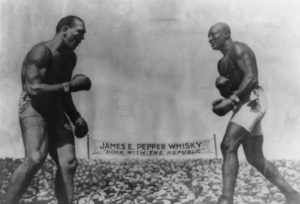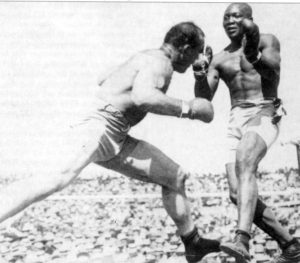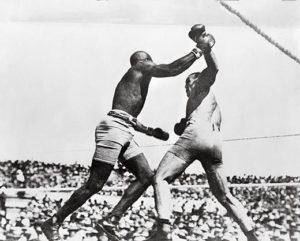Jack Johnson vs James J. Jeffries

Significance
It was 1910, when the second ‘Fight of the Century’ took place between Jack Johnson and James J. Jeffries took place. In terms of symbolism and moral meaning, it was the biggest fight in that sense until the American-German affair between Joe Louis and Max Schmeling. The motivation and intentions of James J. Jeffries, who was now ‘The Great White Hope, were clear: “I am going into this fight for the sole purpose of proving that a white man is better than a Negro.”
Background
In 1903, Jack Johnson had become the first Coloured heavyweight champion in boxing’s short history (up until this point). In a time where Blacks could not even share the same toilet as their White counterparts, Jack Johnson incited hatred and outrage within the public, not just because he won the title that represents being the strongest man on Earth, but it was the flamboyant flashiness he conveyed while carrying the title. Johnson drove flashy cars, talked a cocky game and was always in the company of beautiful women. White women to be precise. And remember, this is in a time where it wasn’t uncommon for a black man to be lynched for doing such things.
The public demanded that James J. Jeffries, the undefeated champion who carried the title with prestige and respect, come back and put Johnson in his place. Jeffries by this point had been retired for 6 years, and had ballooned a whole 90 pounds, and now weighed 300 pounds. Jeffries was happily retired. But the demand from the public, and actually Jack Johnson himself was motivating his comeback. Jack Johnson had once went to Jeffries saloon a few years earlier and called him out, but was rejected.After Jeffries agreed to fight Johnson, a stadium was built in Nevada specifically for the fight. The winner was to get 60 percent of the $101,000, and the betting makers had Jeffries a favourite 10-7. Tens of thousands gathered in public spaces to listen megaphone announcements of the fight that would superficially define racial strength over the other.

The Fight
Tex Rickard, who was promoter, was also the referee for the star studded affair. Among those in the crowd, included past champions and challengers, John L. Sullivan, Bob Fitzsimmons, Tommy Burns, Sam Langford, and Abe Attell, eager to see if the old king would topple the new prince. As the fight got underway, it was soon clear that the six year hiatus done no favours for Jeffries.
Jeffries did make the bout competitive in some periods, getting in occasional shots to keep the champion’s focus. But as the bout went on, it was apparent that the champion was most likely not going to be troubled, countering Jeffries well to keep a foothold on the fight. In round 7, Johnson landed a hard right that hurt the former champion and in between rounds Jeffries complained to his trainers that his arms feel fatigued. Jeffries kept absorbing more punishment, until Johnson knocked Jeffries down the first time in his career, and then the second, and then again the third time, prompting the stoppage.

Aftermath
The victory of the great Black champion triggered race riots all over the country, with hundreds being injured and many being killed. In one of the many instances, a black man who celebrated Johnson’s victory, was slashed in the face from ear to ear.
Just the imagery of a black man beating a white man was enough to influence the criminal justice system to ban the transportation of fight films across the country, fearing that it would cause further race riots from whites who were outraged from the outcome. It would be decades before boxing had another black heavyweight champion, when Joe Louis was navigated to the title by legendary Mike Jacobs. America needed time to come to terms and gather itself back together, after the controversy and significance of the second Fight of the Century between the early kings, Johnson and Jeffries.
“I won from Mr. Jeffries because I outclassed him in every department of the fighting game. Before I entered the ring I was certain I would be the victor. I never changed my mind at any time.” – Jack Johnson after the fight
“I could never have whipped Johnson at my best. I couldn’t have hit him. No, I couldn’t have reached him in 1,000 years.” – Jim Jeffries after the fight

Leave a Reply
Be the First to Comment!